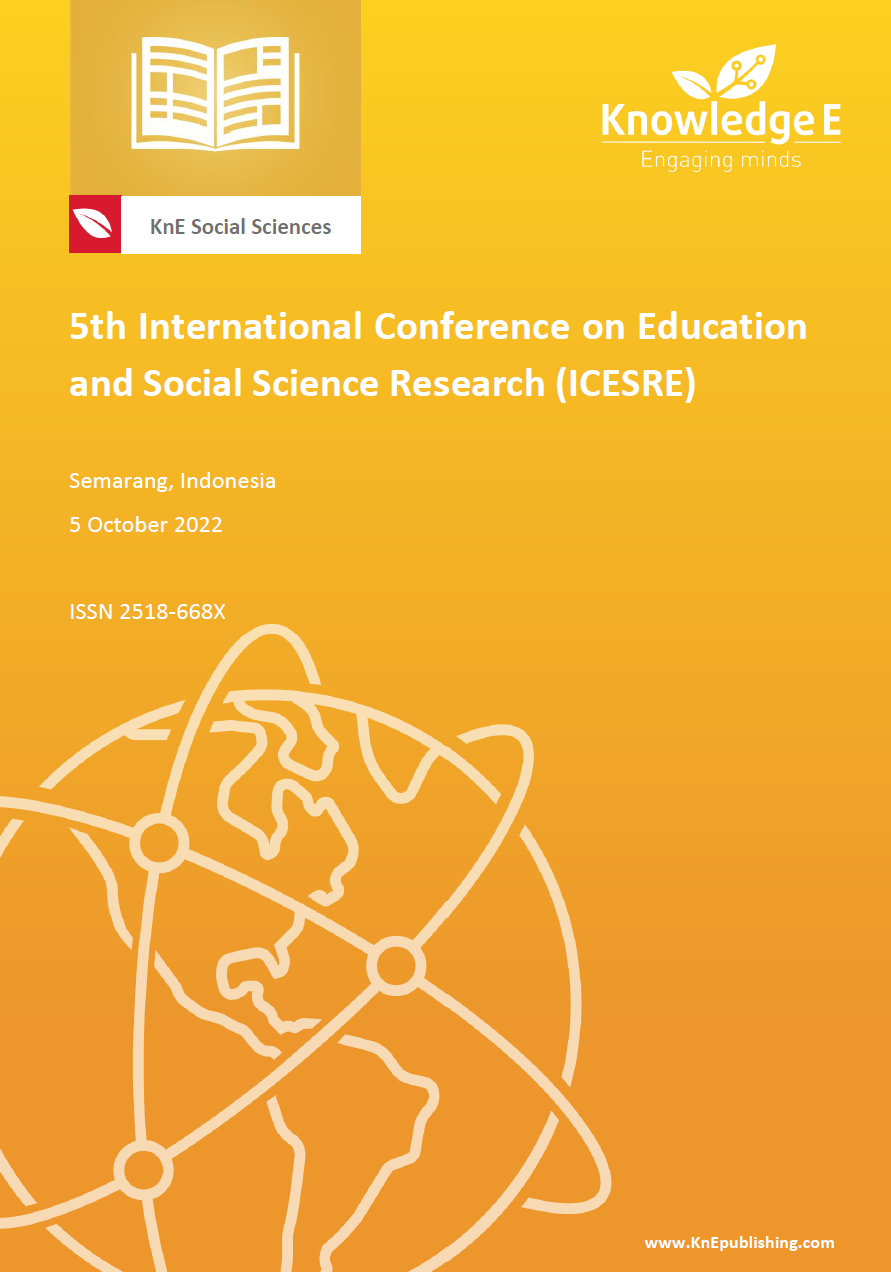Teacher's Perception of the Integration of Science Technology Society (STS) into Learning at Elementary School
DOI:
https://doi.org/10.18502/kss.v7i19.12442Abstract
The Science Technology Society (STS) is an integrated and holistic approach between science, technology, and societal issues. This study aims to determine teachers’ perceptions of integrating science, technology, and society into learning at elementary schools. This study uses a qualitative approach. The respondents of this study were twelve elementary school teachers in the city of Surabaya. The results of this study indicate that teachers respond positively to the Science Technology Society (STS) because it provides an understanding of the relationship between science and technology and society and trains judgment sensitivity.
Keywords: Teacher’s Perception, Science Technology Society (STS), Elementary School
References
[1] Balaman S. Digital storytelling: A multimodal narrative writing genre. Journal of Language and Linguistic Studies. 2018;14:202–212.
[2] Yuliati Y, Saputra DS, Rachmadtullah R, Rasmitadila, Iasha V. The application of guided inquiry model helpful macromedia flash in increasing understanding in natural science learning for fifth grader of primary school. International Journal of Scientific & Technology Research. 2019;8.
[3] Khotimah RP, Adnan M, Ahmad CNC, Murtiyasa B. Science, mathematics, engineering, and mathematics (stem) education in Indonesia: A literature review. Journal of Physics: Conference Series. 2021;1776:012028.
[4] Septiantini T, Samsudin A, Hadiana Aminudin A, Rasmitadila, Rachmadtullah R, Coştu B, et al. Static fluid four-tier instrument (Sffti): Develop and identify k-11 brebes-scholars’ alternative conception with rasch analysis. International Journal of Advanced Science and Technology. 2020;29.
[5] Susanto R, Rachmadtullah R. Multimedia-based learning application development. International Journal of Civil Engineering and Technology. 2019;10:2988–2993.
[6] OECD. Programme for international student assessment. 2018. Available from: https://www.oecd.org/pisa/publications/pisa-2018-results.htm
[7] Primastuti M, Atun S. Science Technology Society (STS) learning approach: An effort to improve students’ learning outcomes. Journal of Physics: Conference Series. 2018;1097:012062.
[8] Poluakan C, Kapubau YV, Suryani NW, Sumampouw HM, Rungkat J. Use of the Science Technology and Society (STS) model with the help of Facebook in science learning for junior high school students. Journal of Physics: Conference Series. 2020;1567:042019.
[9] Alves FF, Castro T. The Impact of Science, Technology and Society (STS) perspective in biology learning in secondary technological institute. 2019 IEEE 19th International Conference on Advanced Learning Technologies (ICALT). 2019:252–254.
[10] Devi MG, Aznam N. The effect of science-technology-society (STS) model on scientific literacy and scientific attitude of students on the subject of buffer. Journal of Physics: Conference Series. 2019;1156:012027.
[11] Purnami W, Sarwanto S, Suranto S, Suyanti RD, Mocerino M. Investigation of Science Technology Ecocultural Society (STEcS) model to enhance eco critical thinking skills. Journal of Innovation in Educational and Cultural Research. 2021;2:77–85.
[12] Beck S, Bergenholtz C, Bogers M, Brasseur T-M, Conradsen ML. The Open Innovation in Science research field: A collaborative conceptualisation approach. Industry and Innovation. 2022;29:136–185.
[13] Pimvichai J, Buaraphan K, Yuenyong C. Development of grade 10 students’ scientific argumentation through the science-technology-society learning unit on work and energy. Journal of Technology and Science Education. 2019;9:428.
[14] Creswell JW. Educational research: Planning, conducting, and evaluating quantitative and qualitative research. New Jersey: Pearson; 2008.
[15] Fukuda K. Science, technology and innovation ecosystem transformation toward society 5.0. International Journal of Production Economics. 2020;220:107460.
[2] Yuliati Y, Saputra DS, Rachmadtullah R, Rasmitadila, Iasha V. The application of guided inquiry model helpful macromedia flash in increasing understanding in natural science learning for fifth grader of primary school. International Journal of Scientific & Technology Research. 2019;8.
[3] Khotimah RP, Adnan M, Ahmad CNC, Murtiyasa B. Science, mathematics, engineering, and mathematics (stem) education in Indonesia: A literature review. Journal of Physics: Conference Series. 2021;1776:012028.
[4] Septiantini T, Samsudin A, Hadiana Aminudin A, Rasmitadila, Rachmadtullah R, Coştu B, et al. Static fluid four-tier instrument (Sffti): Develop and identify k-11 brebes-scholars’ alternative conception with rasch analysis. International Journal of Advanced Science and Technology. 2020;29.
[5] Susanto R, Rachmadtullah R. Multimedia-based learning application development. International Journal of Civil Engineering and Technology. 2019;10:2988–2993.
[6] OECD. Programme for international student assessment. 2018. Available from: https://www.oecd.org/pisa/publications/pisa-2018-results.htm
[7] Primastuti M, Atun S. Science Technology Society (STS) learning approach: An effort to improve students’ learning outcomes. Journal of Physics: Conference Series. 2018;1097:012062.
[8] Poluakan C, Kapubau YV, Suryani NW, Sumampouw HM, Rungkat J. Use of the Science Technology and Society (STS) model with the help of Facebook in science learning for junior high school students. Journal of Physics: Conference Series. 2020;1567:042019.
[9] Alves FF, Castro T. The Impact of Science, Technology and Society (STS) perspective in biology learning in secondary technological institute. 2019 IEEE 19th International Conference on Advanced Learning Technologies (ICALT). 2019:252–254.
[10] Devi MG, Aznam N. The effect of science-technology-society (STS) model on scientific literacy and scientific attitude of students on the subject of buffer. Journal of Physics: Conference Series. 2019;1156:012027.
[11] Purnami W, Sarwanto S, Suranto S, Suyanti RD, Mocerino M. Investigation of Science Technology Ecocultural Society (STEcS) model to enhance eco critical thinking skills. Journal of Innovation in Educational and Cultural Research. 2021;2:77–85.
[12] Beck S, Bergenholtz C, Bogers M, Brasseur T-M, Conradsen ML. The Open Innovation in Science research field: A collaborative conceptualisation approach. Industry and Innovation. 2022;29:136–185.
[13] Pimvichai J, Buaraphan K, Yuenyong C. Development of grade 10 students’ scientific argumentation through the science-technology-society learning unit on work and energy. Journal of Technology and Science Education. 2019;9:428.
[14] Creswell JW. Educational research: Planning, conducting, and evaluating quantitative and qualitative research. New Jersey: Pearson; 2008.
[15] Fukuda K. Science, technology and innovation ecosystem transformation toward society 5.0. International Journal of Production Economics. 2020;220:107460.
Published
2022-12-21
How to Cite
Rachmadtullah, R. ., Pramujiono, A. ., Setiawan, B. ., & Retnani Srinarwati, D. (2022). Teacher’s Perception of the Integration of Science Technology Society (STS) into Learning at Elementary School. KnE Social Sciences, 7(19), 202–209. https://doi.org/10.18502/kss.v7i19.12442

